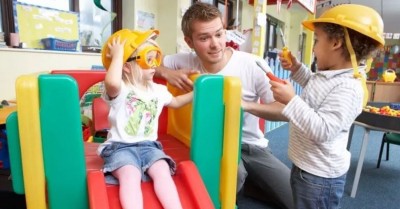The first few years in a child’s life are when values, ideas and attitudes take shape as the result of their experiences, adult responses and wider cultural influences. This is the time when positive role models can convey powerful lessons on gender equality and interpersonal behaviour which have the potential to impact adult life choices. For such reasons, the following article provides information on Traditional Bias, How Men Are Important, How To Encourage Men To Join The ECE Setting and more.
Traditional Bias
For a variety of reasons, teaching children has traditionally been women’s work. Historically, this was one of the earliest professions open to women since teaching was seen as an extension of caring responsibilities that women already performed at home. This was in turn propped up by the belief that teaching and caring for children came “naturally” to women as opposed to men who were thought to be better suited to a life of outdoors and action.
While such factors may have kicked off the gender bias, a cycle of gender and economic inequality ensured that men remained out of early childhood classrooms. Because of its associations with women’s “natural” work, teaching wages in early education have been among the lowest in the market and this in turn discouraged men to enter the field, even when the belief of “natural” suitability lost currency. For example, in New Zealand, less than 1% of male educators work in early childhood education1. And since, men are expected to be the breadwinner in the family – revealing another cog in the biased system – they have the even lesser motivation to enter the field of early childhood education.
The unfortunate corollary of the traditional belief that caregiving was the ‘natural’ work of women was that any men who genuinely wanted to care for and teach young children were perceived as ‘unnatural’ or deviant. Even now, the legacy of this bias continues as male educators report being under greater supervision during interactions with children and even witnessing families pull their children out of programs as they did not want their children to be taught by male teachers2. Indeed, Australian researchers found that there are assumptions that only homosexual men were interested in ECE3. Such an environment of distrust and fears of potential allegations of child abuse also makes early childhood care and education a less appealing option for men.
The few men who do join the sector sometimes find it difficult to continue because of the absence of male peer groups and other professional support systems.
How Men Are Important
Children need role models to counter deeply ingrained gender stereotypes in home, community and popular culture. And among the most pernicious of these is that caring and teaching are ‘natural’ to women but not men. The consequences of such biases are wide-ranging, from burdening women with disproportionately heavier caregiving responsibilities to robbing men of the chance to be more actively engaged in bringing up their own children.
If more male educators join the sector, children will get more opportunities to grow up seeing how men can be equally caring and loving. That modelling is one of the most effective ways that children learn has been well established. Being cared for by male educators, therefore, has far-reaching potential for the shaping of gender roles and identities of both girls and boys. By getting positive role models, boys will learn that men too can look after others, even children. Girls on their part will grow up knowing that there is nothing unusual in expecting men to share caring and nurturing duties in families. Such learning is key to working towards a more gender-equal society that starts from the home and family.
Another important way that greater visibility of men in early childhood care and education settings can empower future generations is by demolishing the stereotype of the man as the silent, strong gender. For a long, this image has discouraged boys and men to express emotions – ranging from tender affection to grief – as signs of weakness. At worst, the stereotype has perpetuated the idea of ‘tough love’ thereby giving men the licence to stalk, control and rough up women – all in the name of ‘love’. Though many of these behaviours are illegal now, at least in developed societies, and are being recognised as signs of toxic masculinity, more needs to be done to counter the stereotype across contexts. And early childhood male educators have a powerful role in doing so – when boys see their carers as loving sensitive men, they will grow up knowing that love and care do not negate who they are but affirms the essence of being human. Girls on the other hand will grow up knowing that they deserve to be cared for and treated sensitively just like every other human being. It is crucial for children of both genders to grow up knowing that everyone has the capacity to love and care, irrespective of gender.
The disproportionate higher numbers of women as ECE educators may have undesirable consequences too. Studies4 have shown that women educators may end up favouring girls and be less able to relate to developmental behaviour in boys. In contrast, male educators can find it easier to relate to developmentally appropriate boy behaviour instead of looking at it as “behavioural issues.” Male educators can prove to be particularly empowering for boys and girls brought up by single mothers.
The involvement of men in early childhood programmes can greatly expand the range and variety of activities and conversations for all children. For example, the presence of more men can usher in higher tolerance of ‘rough and tumble’ and active play in the ECE setting. In this way, welcoming more male educators can lead to a questioning of practices by the teaching team and management, and inspire a diversity of approaches.
How To Encourage Men To Join The ECE Setting
There are several steps that can be taken on service and sector levels to encourage greater participation of men in early childhood teaching.
Sector and service representatives should reach out to high schools to motivate boys to find out more about this career option. It will be useful if such representatives are armed with the job and pay statistics to counter myths and false assumptions about job prospects in the ECE setting.
When approached by their local high school to have students visit, services should see this as an opportunity to inspire students, including boys, to consider ECE teaching as a career. Such visits can also give services the opportunity to identify potential staff for on-the-job training once they have finished high school.
As part of a strategic approach to employing more men in their setting, services should facilitate open, purposeful, no-blame discussions on gender issues, fears and biases. The such conversation would not only help management identify barriers to diverse gender representation in staff but also allow women educators to process their biases and assumptions, if any.
An argument often used against employing men in childcare is that ‘parents will be against it’. But services should be guided by the evidence before they arrive at such conclusions. For example, New Zealand studies show that this is true of usually only a small minority of parents – around 1 to 4%5. Services should thus reach out to families in an effort to allay their concerns which may just be the consequence a bad experience with a person of the male gender. At the same time, families should be allowed to exercise their choice to leave or stay with the service standing firmly behind their male teachers.
Yet another way to increase male presence in early childhood teaching is to control high drop-out rates. This can be done by encouraging support networks and peer groups for male educators so that they can meet other men doing similar work, ask questions and exchange stories.
In order to redress the imbalance between genders in the ECE setting, some motivational measures like offering scholarships may have to be taken at the sector or government levels. New Zealand for example, has the Men in ECE Invitation Award to welcome men to embark on formal training for an ECE teaching qualification.
References:
Reasons for Lack Of Males In Childcare, Pacific Oaks
Lyons, M., Quinn, A., & Sumsion, J. (2005). Gender, The Labour Market, The workplace And Policy In Children’s Services, Australian Journal of Early Childhood, 30(1), 6-13.
Allowing and Enabling Men To Work With Young Children, Child Forum







 As an Educator in Australia, your pay rate falls under the Children’s Services Award 2010. This award states the minimum amount that an employer can
As an Educator in Australia, your pay rate falls under the Children’s Services Award 2010. This award states the minimum amount that an employer can When working as a qualified Early Childhood Teacher (with a university degree) within a service, your rate of pay will come from the Educational Services
When working as a qualified Early Childhood Teacher (with a university degree) within a service, your rate of pay will come from the Educational Services When working as a Diploma Qualified Educator your pay rate is from the Children's Services Award 2010. This Award states your minimum rate of pay
When working as a Diploma Qualified Educator your pay rate is from the Children's Services Award 2010. This Award states your minimum rate of pay When working as a Cert 3 Qualified Educator, your pay rate is from the Children's Services Award 2010. This Award states your minimum rate of
When working as a Cert 3 Qualified Educator, your pay rate is from the Children's Services Award 2010. This Award states your minimum rate of Educational Leaders play a crucial role in their early childhood service by ensuring that the educational program aligns with best practices and supports the holistic
Educational Leaders play a crucial role in their early childhood service by ensuring that the educational program aligns with best practices and supports the holistic In early childhood education and care, ratios are more than a technicality—they are a frontline safeguard. Every child deserves responsive supervision, emotional connection, and developmental
In early childhood education and care, ratios are more than a technicality—they are a frontline safeguard. Every child deserves responsive supervision, emotional connection, and developmental Here’s a comprehensive Mobile Phone and Smart Watch Policy tailored for early childhood education and care (ECEC) services in Australia, aligned with the latest 2025
Here’s a comprehensive Mobile Phone and Smart Watch Policy tailored for early childhood education and care (ECEC) services in Australia, aligned with the latest 2025 With the new national child safety reforms kicking in on 1 September 2025, early childhood services like yours have a real opportunity to lead the
With the new national child safety reforms kicking in on 1 September 2025, early childhood services like yours have a real opportunity to lead the The Sea of Fish Challenge is a national initiative that invites children, educators, families, and communities to create and display fish artworks as a symbol
The Sea of Fish Challenge is a national initiative that invites children, educators, families, and communities to create and display fish artworks as a symbol Across the early childhood education and care sector, educators are sounding the alarm: current staffing ratios are insufficient to deliver safe, meaningful, and developmentally appropriate
Across the early childhood education and care sector, educators are sounding the alarm: current staffing ratios are insufficient to deliver safe, meaningful, and developmentally appropriate


